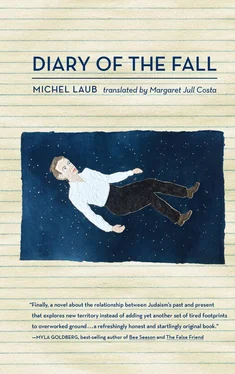5.
I lived with my mother at the time. She didn’t want to move just because of what happened to my father. I didn’t even think about it then, nor did it occur to me that people would move when something like that happened. Because all his things were still there. Ten years later I would still sometimes find something of his. A napkin with his monogram on it. A pen. An ashtray .
6.
If I felt what my father had always felt about my grandfather, I wouldn’t have gone to Porto Alegre when I found out he’d been diagnosed with Alzheimer’s. I wouldn’t have stopped my mother from falling as she stood swaying at the door to their apartment. I wouldn’t have been welcomed by my father as if he already knew everything too, standing there immaculately combed and shaved, wearing a smart shirt and shoes, two o’clock in the afternoon and there he was ready to go out to lunch or to a meeting still smelling of the shaving lotion he’d put on, and all to receive the news that in less than five years he would be technically dead, and had I understood him as little as he did my grandfather, had I known nothing of the deep pool of grief that lay hidden until the fight we had when I was thirteen and he finally stopped using Nazism as an excuse for my grandfather, for what he really felt about my grandfather — something I only realized many years later and only properly grasped very recently, when I had access to my father’s memoir — had my relationship with him been ruined in the way his relationship with my grandfather had, I wouldn’t have flown to Porto Alegre to tell him that he had Alzheimer’s and wouldn’t have realized that this would change not only his life, but mine as well.
7.
There are two possible responses to the nonviability of human experience at all times and in all places. There is my grandfather’s response, and I think I told my father everything I had to say on that subject when I was thirteen, in the only way I could at that age, and when I think about that fight today and the way my father looked at me during the fight and during our conversation on the day after the fight and the way he behaved subsequently, I realize that he secretly accepted I was right, and had known this for a long time, and that he could have come out with exactly the same words I had used, those I could muster at the time, and until then no one had so bluntly reminded my father that my grandfather had clung to an excuse, made it his alibi, an aura that turned him into a kind of martyr, a saint, despite having ruined my father’s life by following to the letter the predictions contained in the tons of books and thousands of films and endless hours of discussion about the nonviability of human experience at all times and in all places and the inevitable fate met by all those who came in contact with it, even when that nonviability bore a name as symbolic and beyond debate as Auschwitz.
8.
Is it possible to hate an Auschwitz survivor in the way my father did? Is it permissible to feel such pure hatred, without at any moment falling into the temptation of moderating that feeling because of Auschwitz, without feeling guilty for placing one’s own emotions above something like the memory of Auschwitz?
9.
Is it possible that one’s hatred of an Auschwitz survivor could indicate a kind of indifference toward Auschwitz, as if hating the survivor, which can sometimes amount to wishing him ill, meant that you were indifferent to and might even endorse any evil done to him, even if that evil was carried out in Auschwitz?
10.
The second possible response to the nonviability of human experience at all times and in all places is my father’s. And if there is a way of summing up what a son feels for his father when he learns that his father is ill, I could simply mention that my father didn’t do what my grandfather did, that he appears never even to have thought about it, and at no point did he give any indication that he had even so much as considered the idea that my birth made no difference, that my childhood meant nothing, that my presence could not keep him from succumbing in the way my grandfather succumbed. If I hadn’t felt that gratitude toward him, which convinced me it was possible for a son to feel such a thing for his father, that it was possible for there to be something good about the relationship between son and father, reason enough still to believe in the relationship between son and father, were it not for that I wouldn’t have told him that he had Alzheimer’s, not after the ultimatum my third wife had just given me.
11.
I met my third wife at a dinner party. There were ten or fifteen of us sitting around a big table. The house belonged to an advertising executive. Advertising executives still enjoy buying and showing off paintings. I sat down opposite one of those images of polar bears that are supposed to suggest a kind of innocence but with a cosmopolitan touch, and I don’t know whether it was our host’s idea or simply the order in which the guests arrived, because I can’t remember now if I got there early or late, if I was delayed by traffic or a meeting at the end of the day, or if my third wife was delayed because she couldn’t decide what to wear or because of work or because one of her girlfriends rang her up at the last moment, I don’t know if there was some special reason or if it was pure chance that she ended up sitting next to me.
12.
At the time I was drinking every night. I drank in the afternoons too, although not always and without it affecting my work too much. My work is perfectly compatible with heavy drinking, and not just because I get up late and work at home and only need two or three hours of concentrated work per day, enough to deliver two or three articles a week and publish two or three books every ten years, but also because at forty, alcohol still doesn’t seriously affect you: contrary to what people think, you can continue to age without any of your organs showing any change in any of the tests you arrange to have done, each time scarcely able to believe that you’ve survived unscathed yet again.
13.
Before the age of forty, alcohol is more happy than sad. The nights of a drinker are better than those of a nondrinker. The conversations of a drinker are more amusing than those of a nondrinker. People who drink are more attractive than those who don’t. The feeling of going home on a Wednesday morning when it’s already light and looking at the nondrinkers making their way to an office where they’ll spend nearly two-thirds of the day feeling proud of themselves because at least they’re not like you, sitting in a local café drinking a glass of chocolate milk laced with brandy, the nondrinkers sitting in their cars and thinking you’re just a forty-year-old idiot who hasn’t yet realized he’s not eighteen anymore, and it’s because you know that at the end of the day and the month you’ll be exactly like all of them, having paid or not paid your rent, being employed or unemployed, having a marriage, health insurance, a vase of flowers, that, ultimately, it all comes down to the same thing even though you live each minute far more intensely than any of them, that’s why you leave the café and walk unsteadily back to your apartment where you say hi to the caretaker and enter your apartment and feel no shame at all as you fall onto the bed with your shoes still on, until your third wife decides that enough is enough.
14.
My real problem with drink isn’t physical exactly. It isn’t material either, in the sense that you can compare the wealth and the work record of someone who drinks with someone who doesn’t. As with everything in this story, it’s a problem that goes back to when I was fourteen, when I changed schools for the second time and, grown weary of swimming against the tide, tried to fit in with the norm: my classmates in the third school also mixed cachaça with cola, they also borrowed the car of whoever’s father happened to be away traveling so that we could visit bars and parties and crowded streets and find some excuse to end the night as we always did, someone else’s girlfriend, someone’s clothes, someone’s appearance or the way someone moved or breathed, because all you have to do is hold your victim’s gaze and make sure he’s with friends in whose presence he can’t be seen to be backing down, you just have to touch his shoulder, give him a tiny shove, poke him with your finger, so that in the ensuing fifteen minutes of every Friday and Saturday night, for years and years, you can continue to prove that you’re not afraid of anything or anyone.
Читать дальше












